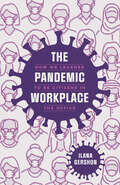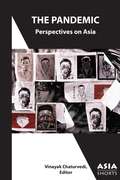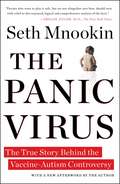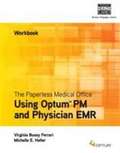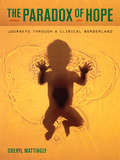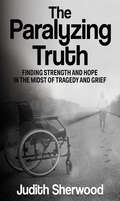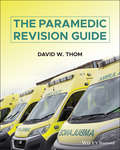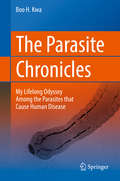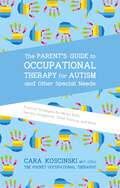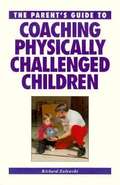- Table View
- List View
The Pandemic Workplace: How We Learned to Be Citizens in the Office
by Ilana GershonA provocative book arguing that the workplace is where we learn to live democratically. In The Pandemic Workplace, anthropologist Ilana Gershon turns her attention to the US workplace and how it changed—and changed us—during the pandemic. She argues that the unprecedented organizational challenges of the pandemic forced us to radically reexamine our attitudes about work and to think more deeply about how values clash in the workplace. These changes also led us as workers to engage more with the contracts that bind us as we rethought when and how we allow others to tell us what to do. Based on over two hundred interviews, Gershon’s book reveals how negotiating these tensions during the pandemic made the workplace into a laboratory for democratic living—the key place where Americans are learning how to develop effective political strategies and think about the common good. Exploring the explicit and unspoken ways we are governed (and govern others) at work, this accessible book shows how the workplace teaches us to be democratic citizens.
The Pandemic: Perspectives on Asia (Asia Shorts)
by Vinayak ChaturvediThis collection of essays provides analyses of the COVID-19 pandemic in Asia. It covers the first phase of the pandemic that will help future scholars to contextualize the history of the present. It includes interpretations by leading scholars in anthropology, food studies, history, media studies, political science, and visual studies, who examine the political, social, economic, and cultural impact of COVID-19 in China, India, Korea, Japan, Taiwan, and beyond. Contributors are David Arnold, Manan Ahmed Asif, Mary Augusta Brazelton, Clare Gordon Bettencourt, Yong Chen, Alexis Dudden, John Harriss, Jaeho Kang, Ravinder Kaur, Catherine Liu, Kate McDonald, Sumathi Ramaswamy, and Christine Yano. The volume is introduced by Vinayak Chaturvedi and concludes with an afterword by Kenneth Pomeranz. The timely and provocative essays in the volume will be of interest to scholars, teachers, students, and general readers.
The Pangenome: Diversity, Dynamics and Evolution of Genomes
by Hervé Tettelin Duccio MediniThis open access book offers the first comprehensive account of the pan-genome concept and its manifold implications. The realization that the genetic repertoire of a biological species always encompasses more than the genome of each individual is one of the earliest examples of big data in biology that opened biology to the unbounded. The study of genetic variation observed within a species challenges existing views and has profound consequences for our understanding of the fundamental mechanisms underpinning bacterial biology and evolution. The underlying rationale extends well beyond the initial prokaryotic focus to all kingdoms of life and evolves into similar concepts for metagenomes, phenomes and epigenomes. The book’s respective chapters address a range of topics, from the serendipitous emergence of the pan-genome concept and its impacts on the fields of microbiology, vaccinology and antimicrobial resistance, to the study of microbial communities, bioinformatic applications and mathematical models that tie in with complex systems and economic theory. Given its scope, the book will appeal to a broad readership interested in population dynamics, evolutionary biology and genomics.
The Panic Virus: A True Story of Medicine, Science, and Fear
by Seth MnookinWHO DECIDES WHICH FACTS ARE TRUE? In 1998 Andrew Wakefield, a British gastroenterologist with a history of self-promotion, published a paper with a shocking allegation: the measles-mumps-rubella vaccine might cause autism. The media seized hold of the story and, in the process, helped to launch one of the most devastating health scares ever. In the years to come Wakefield would be revealed as a profiteer in league with class-action lawyers, and he would eventually lose his medical license. Meanwhile one study after another failed to find any link between childhood vaccines and autism. Yet the myth that vaccines somehow cause developmental disorders lives on. Despite the lack of corroborating evidence, it has been popularized by media personalities such as Oprah Winfrey and Jenny McCarthy and legitimized by journalists who claim that they are just being fair to "both sides" of an issue about which there is little debate. Meanwhile millions of dollars have been diverted from potential breakthroughs in autism research, families have spent their savings on ineffective "miracle cures," and declining vaccination rates have led to outbreaks of deadly illnesses like Hib, measles, and whooping cough. Most tragic of all is the increasing number of children dying from vaccine-preventable diseases. In The Panic Virus Seth Mnookin draws on interviews with parents, public-health advocates, scientists, and anti-vaccine activists to tackle a fundamental question: How do we decide what the truth is? The fascinating answer helps explain everything from the persistence of conspiracy theories about 9/11 to the appeal of talk-show hosts who demand that President Obama "prove" he was born in America. The Panic Virus is a riveting and sometimes heart-breaking medical detective story that explores the limits of rational thought. It is the ultimate cautionary tale for our time.
The Pantry Cookbook: How To Cook Nutritious Meals From Scratch, On A Budget, When Time Is Short
by Michelle ClayThe Pantry Cookbook: how to cook nutritious meals from scratch, on a budget, when time is short. The American diet is all too often a mishmash of pre-made, mass-produced foods which are expensive, high in calories, and low in nutrients. The popular alternative, gourmet cooking, makes all home cooking appear to take long, and involve expensive, intimidating ingredients. But home cooking doesn't have to be this way. In the Pantry Cookbook, you will learn fundamental recipes and cooking techniques that allow you to whip up nutritious, cheap meals, from scratch, in a minimum of time. This is a user-friendly textbook for beginning cooks, a reference for those who wish to rely less on canned soup and instant side-dishes, and a resource for those who already know how to cook a few things but wish to have a more solid foundation of cooking skills. The Pantry Cookbook has over 130 recipes, including basics like hard-boiled eggs, baked chicken, boiled beans, boiled grain, and sautéed vegetables; classics like beef stew, borscht, and pulled pork; and "Quick Recipes" that can be put together in thirty minutes on a weeknight using ingredients prepared on a weekend. Additional features include shopping lists and menus for a week's worth of meals, an extensive list of substitutions, boxed lunch suggestions, kitchen safety information, money-saving tips, spice mix recipes, ideas for feeding toddlers and other picky eaters, and a complete Thanksgiving menu. The Pantry Cookbook is also a fund raising tool! Instead of a standard copyright, the Pantry Cookbook is licensed under a Creative Commons Attribute which allows non-profit organizations to publish, sell, and collect royalties on the book, so long as the profits are used to support programs that address hunger or nutrition issues.
The Papanicolaou Society of Cytopathology System for Reporting Pancreaticobiliary Cytology
by Martha Bishop Pitman Lester James LayfieldThis text and the terminology developed by the Papanicolaou Society of Cytopathology (P. S. C. ) represents an important advance in the field of pancreaticobiliary cytopathology. This textbook/atlas is designed to present a comprehensive and state of the art approach to the cytologic diagnosis and reporting of pancreaticobiliary lesions. Chapters address each of the diagnostic categories defined by the P. S. C. The definition of each category along with the clinical pathologic entities contained within the category are discussed along with specific cytologic criteria for inclusion of a cytologic specimen within the category. Each chapter is lavishly illustrated demonstrating diagnostic criteria and examples of lesions contained within the category. Additionally, appropriate ancillary testing is discussed and where appropriate illustrated. Each chapter concludes with a discussion of appropriate management as well as estimates of malignancy risk for the category. The Papanicolaou Society of Cytopathology System for Reporting Pancreaticobiliary Cytology: Definitions, Criteria, Ancillary Testing and Management will provide the reader with a unified approach to diagnosing and reporting interpretations of cytologic specimens obtained from the pancreaticobiliary tract. This text/atlas will serve as a reference guide for pathologists, surgeons, endoscopists and radiologists.
The Papanicolaou Society of Cytopathology System for Reporting Respiratory Cytology: Definitions, Criteria, Explanatory Notes, and Recommendations for Ancillary Testing
by Lester J. Layfield Zubair BalochThis text presents comprehensive review of the recommendations of the Papanicolaou Society of Cytopathology for reporting results of respiratory cytology specimens along with advances in diagnostic, prognostic, and predictive immunohistochemical and molecular techniques which can be performed on cytology specimens.The majority of the text focuses on the standardized terminology and nomenclature for respiratory cytology as recommended by the Papanicolaou Society of Cytopathology. Each of the diagnostic categories are described in depth and formal definitions for each category are given along with cytologic criteria. Explanatory notes are given discussing limitations of the category as well as its malignancy risk and reproducibility. Management recommendations are supplied for each category. Sample reports documenting the preferred reporting format are also given. Each category is associated with a reference list establishing the evidence based nature of the categories.An in depth discussion of ancillary testing is provided, including the utilization of microbiologic culture, immunohistochemistry, and molecular techniques. Substantial emphasis is placed on molecular diagnostics necessary for optimization of personalized testing and the appropriate use of targeted therapies. The text represents a comprehensive resource for the state of the science of the cytologic diagnosis of respiratory lesions.
The Paper Office for the Digital Age: Forms, Guidelines, and Resources To Make Your Practice Work Ethically, Legally, and Profitably
by Edward L. Zuckerman Keely KolmesSignificantly revised and updated to include online and computerized aspects of private practice, this essential manual has given many tens of thousands of clinicians the complete record-keeping and risk-reduction tools that every psychotherapy practice needs. The book provides effective methods for obtaining informed consent, planning treatment and documenting progress, managing HIPAA compliance, maintaining clinical and financial records, communicating with clients and third-party payers, and reducing malpractice risk. Drawing from the professional literature, it features key guidance and easy-to-digest pointers about the ethical, legal, and business aspects of practice. With a large-size format for easy photocopying, the book and enclosed CD-ROM include 53 reproducible forms and handouts. Purchasers also get access to a companion website where they can download and customize the reproducible materials. <p><p> New to This Edition: <p>*Updated throughout to reflect today's greater use of electronic/digital technologies in practice management. <p>*Chapter on insurance and billing, coping with managed care, and Medicare. *Chapter on private practice marketing, including Internet and social media dos and don'ts. <p>*Expanded topics: HIPAA compliance, ICD-10, responding to subpoenas, and using online technologies for billing, communication, and record keeping. <p>*Information about hundreds of websites dealing with all aspects of operating a practice. <p><p> See also Clinician's Thesaurus, 8th Edition, by Edward L. Zuckerman, the indispensable resource for conducting interviews and writing psychological reports.
The Paperless Medical Office Workbook (Using Harris CareTracker)
by Optum Virginia Ferrari Michelle HellerThe student workbook is design to help you retain key chapter content. The workbook is a stripped down version of the comprehensive textbook, and includes only the step-by-step student activities. These activities allow students to focus on how to use Harris CareTracker and provide ample opportunity to practice using administrative, practice management, clinical, billing and coding functions.
The Paradox of Hope
by Cheryl MattinglyGrounded in intimate moments of family life in and out of hospitals, this book explores the hope that inspires us to try to create lives worth living, even when no cure is in sight. The Paradox of Hope focuses on a group of African American families in a multicultural urban environment, many of them poor and all of them with children who have been diagnosed with serious chronic medical conditions. Cheryl Mattingly proposes a narrative phenomenology of practice as she explores case stories in this highly readable study. Depicting the multicultural urban hospital as a border zone where race, class, and chronic disease intersect, this theoretically innovative study illuminates communities of care that span both clinic and family and shows how hope is created as an everyday reality amid trying circumstances.
The Paralyzing Truth: Finding Strength and Hope in the Midst of Tragedy and Grief
by Judith SherwoodAlthough our hearts ached, our negative emotions demanded us to give up hope from this tragedy, but we couldn't let them dictate how the rest of this journey would end. We took back control. Romans 8:18 Yet what we suffer now is nothing compared to the glory, He will reveal to us later. We learned through this journey that we could rely on our faith each day, one day at a time, living beyond the lies we tell ourselves, and that we could find strength and hope and get through each day as it came, as long as we were willing to make the right choices over and above our feelings, God is always faithful to give us the strength we need. If you feel alone in the midst of a storm you're facing, looking to be inspired and hopeful through one's tragedy, even in Grief, this book is for you.
The Paramedic Revision Guide
by David W. ThomThe Paramedic Revision Guide delivers a one-stop reference for paramedic students, paramedicine educators, and practicing paramedics. Designed to take the mystery out of paramedic education, the book provides a solid foundation of understanding in crucial areas of paramedic science and practice, including practical skills, research, anatomy and physiology, pharmacology, and medical emergencies. This guide furthers readers’ understanding and practice of emergency care, and includes: A thorough introduction to paramedic anatomy and physiology, including anatomical and medical terms, cellular biology, and pediatrics An exploration of practical skills for paramedics, including scene survey, airway practices, basic life support and defibrillation, burns, and head injuries Practical discussions of medical emergencies, research and evidence-based practice, and the ethical and legal considerations for paramedics An analysis of pre-hospital trauma treatment, including the physics and physiology of trauma The Paramedic Revision Guide earns a place on the shelves of all paramedic students and educators who need a comprehensive handbook full of succinct and easily digestible information, ideal for exam preparation and quick reference.
The Paramedic's Secret Son
by Rachel DoveHe thought he had to leave……Now he has two reasons to stay!Eight years ago, paramedic Harry walked away from Annabel, knowing that it would break both of their hearts but that staying would only hurt her more. Now Harry has returned to discover that Annabel wasn&’t the only one he left behind—he has a seven-year-old son! Knowing he&’s a father makes him even more determined to win Annabel—and little Aidan—back… &“…I found Rachel Dove's interpretation broke that mold and I enjoyed the realistic way in which she painted the personalities. All in all, the well-crafted characters plus the engaging story had me emotionally invested from the start. Looking forward to reading more of Rachel's work.&”-Goodreads on Fighting for the Trauma Doc&’s Heart
The Paramedic's Unexpected Hero
by Alison RobertsCan this maverick midwife……be her knight—in shining leathers?Thrown together with motorbike-riding, leather-wearing midwife Ari Lawson, cautious paramedic Kelly Reynolds is immediately out of her comfort zone. But when they find their paths keep crossing, Kelly discovers she was too quick to judge, because beneath his bad-boy exterior, he’s dedicated, kind—and irresistible! Being around him makes her finally feel safe—and, dare she say, loved for the first time?
The Parasite Chronicles: My Lifelong Odyssey Among The Parasites That Cause Human Disease
by Boo H. KwaThis book introduces the reader to the fascinating world of parasites that cause human disease. It is written in a first-person style relating anecdotes and personal encounters of parasites by the author. It tells stories about exotic parasites diseases, interesting factoids about the life history of unusual parasites species, and strange ways in which humans can become infected. However this is also a serious topic, as there is increasing movement of populations and goods occurring in a globalized world, resulting in previously exotic parasites being brought into new regions of the world. This book about parasite infections will be of interest to business travelers and tourists alike, and the book discusses simple common sense ways to avoid them.
The Parasite-Stress Theory of Values and Sociality
by Randy Thornhill Corey L. FincherThis book develops and tests an ecological and evolutionary theory of the causes of human values--the core beliefs that guide people's cognition and behavior--and their variation across time and space around the world. We call this theory the parasite-stress theory of values or the parasite-stress theory of sociality. The evidence we present in our book indicates that both a wide span of human affairs and major aspects of human cultural diversity can be understood in light of variable parasite (infectious disease) stress and the range of value systems evoked by variable parasite stress. The same evidence supports the hypothesis that people have psychological adaptations that function to adopt values dependent upon local infectious-disease adversity. The authors have identified key variables, variation in infectious disease adversity and in the core values it evokes, for understanding these topics and in novel and encompassing ways. Although the human species is the focus in the book, evidence presented in the book shows that the parasite-stress theory of sociality informs other topics in ecology and evolutionary biology such as variable family organization and speciation processes and biological diversity in general in non-human animals.
The Parathyroid Glands
by Alexey V. Pavlov Arian P. Kalinin Irina V. Kotova Sergey N. Pamputis Yury K. Alexandrov Yury N. PatrunovThis book is based on the authors' extensive practical experience in the use of modern radiological methods to diagnose parathyroid diseases and the application of advanced surgical techniques. Detailed attention is devoted to the embryological background to emphasize the significance of diagnostic and surgical peculiarities. Pre- and intraoperative imaging is discussed in depth, with a special focus on localizing techniques. Ultrasound-guided minimally invasive techniques, including percutaneous laser ablation, are fully considered. This up-to-date and richly illustrated book will interest and assist specialists in ultrasound diagnostics, radiologists, endocrinologists, and surgeons.
The Parent's Complete Guide to Ayurveda: Principles, Practices, and Recipes for Happy, Healthy Kids
by Jayarajan Kodikannath Alyson Young GregoryA comprehensive and user-friendly guidebook including over 50 Ayurvedic health and wellness practices for children, ages 3–16, with healing plans for common ailments—co-written by an Ayurveda specialist with over two decades of experience in pediatric health.The traditional holistic health system of Ayurveda offers a wealth of effective lifestyle advice and remedies for the whole family. The Parent&’s Complete Guide to Ayurveda is an accessible primer to pediatric Ayurveda, with simple, commonsense dietary, herbal, and self-care practices to both address various ailments and promote vibrant health and well-being in children ages 3–16. Dr. Jayarajan Kodikannath, an Ayurvedic specialist, and Alyson Young Gregory, an Ayurvedic health counselor and educator, provide a wellness roadmap that parents can tailor to their children&’s individual mind-body type, known as prakriti. This book first gives parents the tools to determine their child&’s prakriti and then offers customized everyday diet and lifestyle guidelines based on traditional Ayurvedic principles for a healthy body and mind, including yoga, meditation, breathing practices, and daily wellness routines. The advice offered in this book includes:How to prevent and manage common ailments and disorders with diet and home remediesHow to encourage healthy habits around sleep, diet, exercise, and screen timeEasy-to-make tonics, teas, and soaks to alleviate a number of conditions, including tummy aches, stress, colds, insomnia, sluggishness, and dehydrationAyurvedic perspectives on digestive, metabolic, respiratory, and emotional disorders prevalent in children today And much more.
The Parent's Guide to Homeopathy
by Shelley KeneippThis book is the most comprehensive and easy-to-use guide available for parents who want to use homeopathy to treat their children's illnesses safely, gently, and effectively. Practical, concise, and user-friendly, The Parents' Guide to Homeopathy provides homeopathic remedies for more than 150 acute conditions, from annoying to threatening, that arise in the everyday lives of kids. Instructions on how to observe physical and emotional symptoms in kids from newborns to teens; succinct descriptions of gentle, safe, and nontoxic remedies; and sections on winter ailments, first-aid, enhancing healing, and travel put a wealth of knowledge at parents' fingertips. Remedy tables at the back of the book help decipher the correct treatment for each condition. Shelley Keneipp shares her wealth of knowledge and many years of experience to provide a clear, simple education concerning homeopathic remedies. She empowers parents who want to break the habit of relying exclusively on medical expertise and instead to use relatively economical over-the-counter remedies without worrying about harmful side effects. She suggests essential remedies to stock for any household first aid kit; provides background on common ailments such as coughs, colds, fevers, and digestive problems; and includes eye-catching sidebars that alert readers to conditions that demand immediate medical attention. Boxed entries clue readers to what symptoms to observe and how to differentiate between similar presentations. Taken together, these features make this book the gold standard for parents who want apply the gentlest possible cure in the shortest possible time with the fewest reasons for intervention.
The Parent's Guide to Occupational Therapy for Autism and Other Special Needs: Practical Strategies for Motor Skills, Sensory Integration, Toilet Training, and More
by Cara KoscinskiWith the help of this handy guide, you can bring tried and tested occupational therapy activities into your home and encourage your child to succeed with everyday tasks while having fun in the process. This expanded edition of the award-winning book includes new advice on toilet training, coping with changes in routine, repetitive behaviors, self-regulation and much more. The simple explanations and easy exercises will soon make daily activities enjoyable and productive.
The Parents Guide to Coaching Physically Challenged Children
by Richard ZulewskiHandbooks in The Better Way Coaching Kids series serve as the perfect step-by-step introductory primers for parents and coaches. Written in an easy, conversational style, these books cover all the basic skill-building techniques, rules of the games, proper equipment and first aid. These guides focus on team spirit, the importance of fair play and overall fun. Special attention is paid to developing a child's confidence and self-esteem, -- all important keys to success.
The Parents' Concise Guide to Childhood Vaccinations, Second Edition: From Newborns to Teens, Practical Medical and Natural Ways to Protect Your Child
by Lauren Feder Letrinh HoangThe latest available information on vaccinations for children (including the meningococcal, HPV vaccinations and rotavirus), as well the most-up-to date schedules and additional information parents need to know to help them make the right decisions regarding vaccines.Regardless of where you stand on the issue of childhood vaccination, everyone agrees that the health of our children is paramount. The Parents' Concise Guide to Childhood Vaccinations, Second Edition is your complete guide to making sure your child gets the proper care at this important time in their development. Updated with the latest vaccine information including: • The inside scoop on rotavirus history • Updated insurance and payment information • New details on vaccine schedulesAnswers important questions about your child’s health: “Do vaccines really cause autism?” “Should I be concerned about the mercury in vaccines?” “What do I do about the shots?”For those who have chosen to vaccinate, The Parents' Concise Guide to Childhood Vaccinations, Second Edition offers both practical medical and natural remedies to avoid possible side effects. If you have chosen not to vaccinate your children, the book also includes natural medicines to strengthen your child’s immune system, along with tips on how to deal with legal exemptions, school requirements, and medical insurances. The Parents' Concise Guide to Childhood Vaccinations, Second Edition is a comprehensive and reassuring guide to help you make the right decision for your child.
The Paris System for Reporting Urinary Cytology
by Dorothy L. Rosenthal Eva M. Wojcik Daniel F. I. KurtyczThe first edition of The Paris System for Reporting Urinary Cytology introduced a completely new paradigm for detecting bladder cancer by urine cytology. This system concentrated on defining morphological characteristics of the most clinically significant form of bladder cancer, High Grade Urothelial Carcinoma. This new approach has been widely accepted throughout the world, and has become part of the daily practice of cytology. Considering that the first edition of The Paris System (TPS) introduced a new model of urinary cytodiagnosis, verification and expansion of initial material and data were anticipated. Based on evolving knowledge and readership requests, the group of highly experienced authors have created a new edition of TPS. This second edition includes areas and issues not originally covered. A new chapter on urine cytology of the upper tract, a rarely addressed topic, has been introduced. Furthermore, the issue of cellular degeneration is discussed in the criteria of all diagnostic categories. Examples of standardized reports are included in each chapter. Most importantly, a separate chapter presents data defining the risk of malignancy (ROM) for each diagnostic category to inform clinical management. New high quality images augment those of the first edition to better illustrate diagnostic clues and potential pitfalls. In addition to chapters on diagnostic criteria, current concepts of pathogenesis of bladder cancer, specimen adequacy and preparation, and ancillary tests are covered in separate chapters. A bonus to the volume is a comprehensive history of urine as the earliest diagnostic sample of human disease, richly illustrated with artworks from major museums. Written by internationally recognized authorities, this comprehensive and evidence-based guide to urine cytology is supported by the newest data confirming the original concept and significance of diagnostic criteria defining High Grade Urothelial Carcinoma. TPS is an essential tool for anyone who is practicing urinary cytology, including cytotechnologists, pathologists-in-training and practicing pathologists. This book should find a place in every cytology laboratory throughout the world. The Concept has been endorsed by the American Society of Cytopathology, and the International Academy of Cytology.
The Paris System for Reporting Urinary Cytology
by Dorothy L. Rosenthal Eva M. Wojcik Daniel F.I. KurtyczThis book describes a novel and proven approach to cytologically classify urinary samples for the detection of bladder cancer and lesions of the upper urinary tract. The new method is based on the collective experience of knowledgeable cytopathologists who have tested the terminology within their own laboratories for reproducibility and predictability of neoplasms of the urinary tract. Accompanying the written criteria for each diagnostic category are meticulously photographed exemplars of the cellular features, with cogently annotated descriptions of the photographs. The book thereby performs as an atlas for microscopists involved in diagnostic cytopathology at all levels of their education. Included in the targeted readership are experienced pathologists, cytotechnologists, and students of both professional groups. The new terminology also considers the clinical aspects of patient management. Written by experts in the field who convened at the 18th International Congress of Cytology in Paris, The Paris System for Reporting Urinary Cytology presents a global standard for reporting and a new philosophic approach that maximizes the strengths of detecting the potentially lethal high grade lesions by urinary cytology, and recognizes without apology the inability to reliably detect the low grade lesions in urinary cytology. The Concept has been endorsed by the American Society Of Cytopathology, and the International Academy of Cytology.
The Park Avenue Face: Secrets and Tips from a Top Facial Plastic Surgeon for Flawless, Undetectable Procedures and Treatments
by Andrew JaconoYour face defines you. It influences how people perceive you at work, at play, and even at home. But what if something about your face doesn't make you feel like the real you? In The Park Avenue Face, dual board-certified facial plastic and reconstructive surgeon Dr. Andrew Jacono reveals how to achieve flawless, undetectable plastic surgery so you can fix what you don't like, restore what you've lost, or prevent signs of aging. From his elite Park Avenue aesthetic surgery center, Dr. Jacono has enhanced tens of thousands of faces not by prescribing an arbitrary standard of beauty, but by amplifying each patient's individual beauty for totally natural results. A global authority in advanced facial plastic surgery, he has presented clinical research and conducted live surgery in front of peer audiences at over 100 plastic surgery symposiums around the world, including at Harvard, Yale and Stanford Universities. Now, he's ready to share his expertise with you. High-end Park Avenue clients want to fight the signs of aging while highlighting their best features. They want lips that look like their own lips, eyes that look like their own eyes. They want facial features in line with their ethnicities. Park Avenue clients want to look powerful yet approachable, wise yet fresh, and above all, natural. With Dr. Andrew Jacono's advice, you can have the Park Avenue Face no matter who you are or where you live. The Park Avenue Face also highlights a trend unique to the United States—a distinct difference between conceptions of beauty on the west coast versus the east coast. Where the West Coast Style is often about changing your personal signature, the East Coast Style prioritizes maintaining your personal signature. Through this up-close look at coastal trends, the reader will learn how to define and achieve a natural look—a face that reflects the person they have always been, and the person they strive to be, not someone they don't recognize in the mirror. If you want a face with character and depth that looks ageless and don't want a stretched, artificial or generic look, Dr. Jacono will show you how to get there. If you are considering any kind of facial enhancement, from minor and non-invasive treatments such as simple injections or a laser treatment to more involved surgical procedures such as a full-on facelift, this is your resource. The Park Avenue Face will show you how to avoid the quacks, the fads, the financial waste, and the dangers. Dr. Jacono will help you determine how you want to look and how best to get there. Featuring fascinating patient anecdotes, dozens of before-and-after photographs showing what the various procedures can accomplish and line drawings by veteran medical illustrator William Winn, this comprehensive guide will fully prepare you to step into a doctor's office and discuss your facial enhancement options. You'll know how each treatment works, how long you will take to recover, and how much change you can expect. If there is something about your face you think is holding you back—decide if making a change is right for you. Let The Park Avenue Face guide you to becoming your best you.
